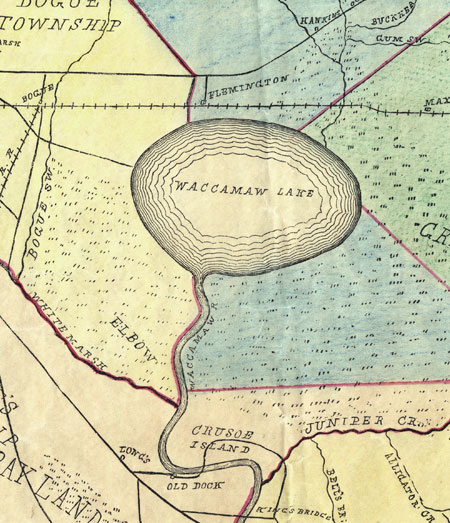It’s Bastille Day and we’re marking the occasion on these shores by remembering Crusoe Island.
Legend has it that the Columbus County community, which now goes by the name Riverview, was founded by French refugees from the revolutions in France and Haiti. Supposedly Jean Formy-Duvall, a French army surgeon in the late 18th or early 19th century, conspired with an execution squad to spare the lives of a small group of royalists. Formy-Duvall and his co-conspirators filled the executioners’ guns with blanks. As the guns discharged, the condemned feigned death. Formy-Duvall created fake death certificates and he and those whose lives he had spared headed for the French countryside. When the conspiracy was discovered the group fled for Haiti.
The fleeing group’s time in Haiti was relatively short-lived. A slave insurrection arose there in 1791 and many French settlers fled the island. Formy-Duvall and his group supposedly took to the Caribbean in an open boat. Sometime thereafter they were picked up at sea by a ship, which eventually dropped them on the North Carolina coast at Smithville (now known as Southport).
At this point the story becomes even more incredible. As historian Wilson Angley has pointed out in Columbus County North Carolina: Recollections and Records , for some unexplained reason Formy-Duvall and his compatriots headed inland toward swampy terrain near Lake Waccamaw. In so doing, they bypassed areas more suitable for settlement.
The location of the settlement, on a small rise of land bounded on 3 sides by the Waccamaw River and on the fourth by Green Swamp ( it’s not actually an island) left its residents relatively isolated. They survived by fishing, subsistence farming, shingle-making, basket-weaving, hunting and occasionally trading furs in the nearby town of Old Dock.
Crusoe Island’s isolation and residents’ distinct style of speech, which struck some visitors as French-sounding, led to speculation as to the community’s origins. Those supporting a tie between France and Crusoe Island also pointed to the similarity between chimneys built in the Columbus County settlement and those constructed in Normandy. Some also suggested that such common Crusoe Island surnames as Sasser and Clewis were Anglicized versions of DeSaucierre and Cluveiries. Other common names in the community–Forney, Duvall, Dubois and Dupre–also suggest a French origin.
Besides French refugees, residents were said to be the descendants of the Lost Colony, pirates hiding from the authorities, white settlers escaping pirate raids on the coast, deserters from the Revolutionary or Civil wars, English settlers and Indians who intermarried and were driven inland from the coast.
The origins of the community’s name are also in dispute. One story suggests that the settlement was named for Ben Crusoe. But there is no Crusoe listed in local census records from the late 1700s and early 1800s.
Residents have long disputed the story of French origins. They trace their ancestry to three settlers of English origins–Cornelis Clewis, Laspeyre Long and Elias Register.
The mysteries and legends tied to Crusoe Island are cited as some of the reasons that locals sought to change the name of the community. And, in 1961, the General Assembly agreed to residents’ request to rename the settlement Riverview.
While legislators may have settled on the community’s name, they were unable to certify its origins. Vive le mystere.

